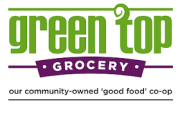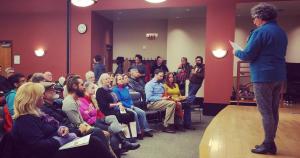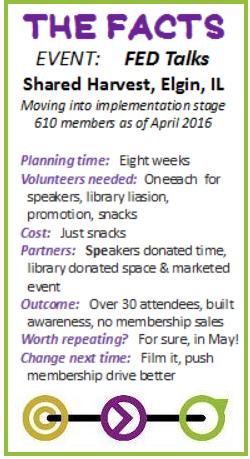By Alan Langrall of Green Top Grocery
 The four cornerstones are constants in the lifecycle of all co-ops, whether they are startups or stores that have been opened for some time. People often come to the table not knowing what they have to offer, or what is expected of them. Helping volunteers find the fit for their personal talents, and work within the group setting, requires thought and evaluation. When the right person is in the right job, the entire group benefits.
The four cornerstones are constants in the lifecycle of all co-ops, whether they are startups or stores that have been opened for some time. People often come to the table not knowing what they have to offer, or what is expected of them. Helping volunteers find the fit for their personal talents, and work within the group setting, requires thought and evaluation. When the right person is in the right job, the entire group benefits.
In 2012, Alan Langrall came to the fledgling Green Top Grocery (GTG) startup the way many people start at co-ops. He saw a poster for the first community meeting and was curious. “I still remember that poster featured a big stalk of broccoli with a light bulb base, and something about it really got my attention.“ He kept going to follow up meetings and became an owner at the first event when ownerships were offered. Not yet knowing what was involved in a startup co-op board, Alan volunteered for the first board. “I must have figured they all seemed to be smart folks and that we could just figure it out as we go “ With others, he has attended several Up & Coming conferences, and is excited to see GTG is now in the process of building their store. The staff of FCI is delighted that Alan is sharing his personal story of working to build a co-op, and he welcomes emails at ablinil@hotmail.com.
It’s all about the love, right? Good ideas naturally attract good people and good fortune, right? While certainly recognizing the maximum effort and the considerable time, energy, and hard work that has gone down, Green Top Grocery has indeed been very fortunate. Fortunate
- to have had that genuine, influential, community minded, original organizer who recognized the opportunity and first came up with the whole idea (Elaine),
- to be positioned early (through funds made available) to find and hire that someone with the unique passion and outreach skills needed to grow our owner numbers (Katie),
- to still have that uniquely talented and generous graphic artist as part of our original heavy lifting team (Melanie),
- to be close enough to that thriving, established, model co-op to be mentored and be supported in so many ways (Common Ground Food Co-op) and
- to have the consulting resources of FCI and CDS Consulting Co-op available that have played and continue to play a huge part in the success of GTG.
For me, these people and the gifts they bring really stand out. There are many more outstanding people involved, and other examples of the love and nurturing they bring to the task. May our good luck and fortune continue.
 As an early owner and board member, I would often have conversations with new owners and others about our co-op. I came to see myself as working in the background of the organization. My contributions are valuable, but of a different nature than some others. They were the heavy lifters, and I was okay with that. We have had a wide range of lifters and levels of involvement over time as people come and go. I have happily done my share as needed, and at very least continue to show up. There were many times where my energies and skill set proved no match for the meeting organizing, document designing, newsletter writing, spreadsheet producing, or tech savvy contributions of others. At one co-op conference I was reminded that organizations benefit and even need people like me. My contributions are more on the order of balancing and calming in nature. I like to believe there have been times where that was needed.
As an early owner and board member, I would often have conversations with new owners and others about our co-op. I came to see myself as working in the background of the organization. My contributions are valuable, but of a different nature than some others. They were the heavy lifters, and I was okay with that. We have had a wide range of lifters and levels of involvement over time as people come and go. I have happily done my share as needed, and at very least continue to show up. There were many times where my energies and skill set proved no match for the meeting organizing, document designing, newsletter writing, spreadsheet producing, or tech savvy contributions of others. At one co-op conference I was reminded that organizations benefit and even need people like me. My contributions are more on the order of balancing and calming in nature. I like to believe there have been times where that was needed.
I recall being part of the reconciliation process through two separate rough patches. Fortunately our consultants helped and their advice was well received. Who knows if my actions moved the pivot points, but it felt right and very necessary at the time. Feelings were indeed hurt each time. Both times, after a few tears and eventual forgiveness, we got back on track. Looking back, it probably made us stronger. I do recall how fragile the whole thing felt with nearly everyone being a volunteer. I wondered what really holds this thing together, and realized it’s really all about the love. You really do have to love it and believe in it. I still wonder occasionally, but now I see it and marvel. As we continue to grow, our momentum feels strong, and that feels pretty great.
Event planning and logistics have ended up being my co-op niche. I just signed on again for another annual meeting planning committee. There will be more events, and a store opening. Check lists! Phone calls! Meetings! Let’s go! We have things to celebrate.
I value this important thought from another co-op conference participant: “If it’s not fun, what’s the point?” Cheers, fellow startup co-ops! Party on!
FCI: Why We Like This: Right from the beginning, matching people’s skills and gifts to the tasks of starting a co-op is super important. The TALENT cornerstone is all about that—putting people to work, seeking out great workers for every task, and building them as steam and keeping the momentum going as the startup progresses. This personal story shows how one committed volunteer can find a niche, adapt to the changing needs of the group, and bring enthusiasm at every turn.


 This spring we sought another avenue to educate people about food and our co-op mission. We had thrown around the idea of TED talks two years ago. After some research, we realized that was not an easy road to take. There is a lot of preparation and paperwork to even be qualified to be part of the TED Talk series.
This spring we sought another avenue to educate people about food and our co-op mission. We had thrown around the idea of TED talks two years ago. After some research, we realized that was not an easy road to take. There is a lot of preparation and paperwork to even be qualified to be part of the TED Talk series.  The weather was cold but clear on the evening of our FED Talks in early February. We planned for an audience of 30 people, but wound up with 50. We had a brief facilitated discussion after the talks and many people lingered over snacks for a good half hour longer.
The weather was cold but clear on the evening of our FED Talks in early February. We planned for an audience of 30 people, but wound up with 50. We had a brief facilitated discussion after the talks and many people lingered over snacks for a good half hour longer. Hosting a movie night can have many benefits for your startup. Publicising the event will create PR for your project. You can likely raise a small amount of money from admissions and/or sale of concessions. If a social hour is held afterwards, movie night can be a community builder. And if you use the titles below, you’re sure to inspire some first rate discussions of food issues.
Hosting a movie night can have many benefits for your startup. Publicising the event will create PR for your project. You can likely raise a small amount of money from admissions and/or sale of concessions. If a social hour is held afterwards, movie night can be a community builder. And if you use the titles below, you’re sure to inspire some first rate discussions of food issues.